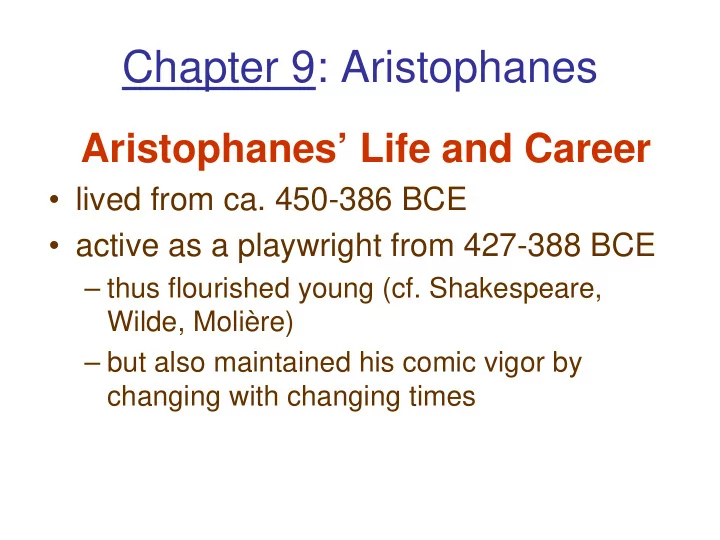

Chapter 9: Aristophanes Aristophanes’ Life and Career • lived from ca. 450-386 BCE • active as a playwright from 427-388 BCE – thus flourished young (cf. Shakespeare, Wilde, Molière) – but also maintained his comic vigor by changing with changing times
Chapter 9: Aristophanes Aristophanes’ Drama • elegant verse mixed in with earthy humor – often sexual/scatological but never gratuitous • focused on current events and political figures, e.g. Cleon • from early on there was a need for commentary, hence scholia(sts) – e.g. scholia cite the dates and festivals of Aristophanes’ plays
Chapter 9: Aristophanes Aristophanes’ Drama • thus, Aristophanes’ plays have always been very important to historians of the Classical Age • but were they ever restaged in antiquity? – he rewrote two plays ( Frogs and Clouds ) – but for a reading public only? • but cf. Taplin’s Comic Angels
Chapter 9: Aristophanes Aristophanes’ First Two Plays • The Banqueters (427 BCE BCE ) – produced by Callistratus because Aristophanes was still too young – won first prize (but at Lenaea or Dionysia?) – agon between a good young man and a profligate young man • cf. Just Reason vs. Unjust Reason in Clouds – a good name for a kom-oidos (“party-song”)
Chapter 9: Aristophanes Aristophanes’ First Two Plays • The Babylonians (Dionysia, 426 BCE BCE ) – little is known about it (e.g., did it win?) – Dionysus is an important character • like in Cratinus’ Dionysalexandros which was produced a few years before – includes a savage attack on Cleon • Cleon sued Aristophanes and slandered his good family name, but Cleon apparently lost the case
Chapter 9: Aristophanes The Acharnians (Lenaea, 425 BCE BCE ) • but Cleon’s case also seems to have kept Aristophanes out of the Dionysia for the next two years • Dicaeopolis (“Just City”) makes a private treaty with Sparta and holds a big komos ! • another attack on war-mongering Cleon • won another first prize (hooray!)
Chapter 9: Aristophanes The Knights (Lenaea, 424 BCE BCE ) • even with Cleon at the height of his power, Aristophanes attacked him again • Cleon is “the Paphlagonian” who caters to Demos (“People”) • a sausage-seller beats the Paphlagonian at a contest over Demos’ affection • won a third first prize (go dude!)
Chapter 9: Aristophanes The Clouds (Dionysia, 423 BCE BCE ) • Aristophanes returns to the Dionysia, but gets third place (ack!) • attack on philosophy • Socrates is unfairly treated as a sophist • real reason for using him: Socrates was ugly!
Chapter 9: Aristophanes The Wasps (Lenaea, 422 BCE BCE ) • Aristophanes goes back to the Lenaea • attacks the Athenian jury system • young Bdelycleon holds home-trial to entertain his conservative father Philocleon • sues family dog Labes for stealing cheese – spoof of General Laches’ embezzlement trial • won second place (whew!)
Chapter 9: Aristophanes The Peace (Dionysia, 421 BCE BCE ) • Cleon is dead now (killed in battle) • the hero wants to fly to heaven and bring the goddess Peace back to earth • rides a giant dung beetle – spoof of Euripides’ Bellerophon – excuse for much scatological humor • won second place (well, okay!)
Chapter 9: Aristophanes The Birds (Dionysia, 414 BCE BCE ) • the birds of the world decide to intercept divine offerings and tax the gods • a spoof of the greed which led to the Sicilian Expedition? • wonderful opportunity for bird costumes! – despite the war, no reduction in theatre budget! • won second prize (thanks a lot!)
Chapter 9: Aristophanes Thesmophoriazusae (“Women Celebrating Demeter”) (411 BCE BCE ) • attack on Euripides and rescue plays of 412 • Euripides dresses an older male relative in drag and sneaks him into a women’s festival • then has to rescue him, à la Helen • did this inspire Pentheus in The Bacchae ?
Chapter 9: Aristophanes Lysistrata (411 BCE BCE ) • Aristophanes’ best known comedy today • women mount a sex strike until the men of Greece agree to stop fighting the war • a spoof of women as much as men • beneath all the comedy lurks a sense of desperation (war? ha ha ha!)
Chapter 9: Aristophanes The Frogs (Lenaea?, 405 BCE BCE ) • the cowardly Dionysus wants to rescue Euripides from Hades • dresses up like Heracles (Hercules) • ends bringing Aeschylus back http://www.usu.edu/markdamen/ClasDram/c hapters/093reading4frogs.htm
Chapter 9: Aristophanes Ecclesiazusae (“Assembly-Women”) (392 or 391 BCE BCE ) • women dress up as men and take over the assembly • n.b. no new costumes • beginning of the change into Middle Comedy
Chapter 9: Aristophanes Plutus (“Wealth”) (388 BCE BCE ) • Aristophanes’ last surviving play • the god of Wealth regains his sight and begins distributing money more fairly • almost no choral odes! • but there are places marked for them – chorou (“chorus’ [song]”) • another sign of things to come!
Recommend
More recommend